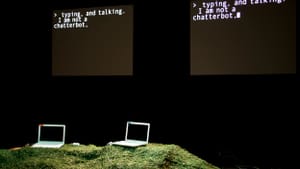Stay in the Loop
BSR publishes on a weekly schedule, with an email newsletter every Wednesday and Thursday morning. There’s no paywall, and subscribing is always free.
Artistic intelligence
Bryn Mawr College Performing Arts Series presents Annie Dorsen’s Algorithmic Theater

There is nothing cold or unfeeling about theater artist Annie Dorsen’s work—perhaps surprising when that work features two chatbots quoting the Bible and Shakespeare onstage. Since 2010, Dorsen has explored what she calls “algorithmic theater.” Working in collaboration with computer programmers, Dorsen creates theater where custom algorithms perform in place of or alongside human actors.
(Not) all about the algorithm
“I'm not so much trying to convey a message about machines,” Dorsen shared after being named a recipient of a 2019 MacArthur Fellowship, “but rather to offer an opportunity for us all to think together about some of the consequences of our increasing entanglement with different kinds of information technologies.”
There’s tension, comedy, suspense, and optimism. And this September, the theatrical interactions of human and machine play out at Bryn Mawr College as part of the first career retrospective of Dorsen’s work.
Four of Dorsen’s pieces will be presented: Hello Hi There, with the aforementioned chatbots; Spokaoke, where speeches take the place of karaoke songs; A Piece of Work, with an actor and computer collaborating on Hamlet; and Yesterday Tomorrow, where singers perform an algorithmically generated score in real-time, with The Beatles’s “Yesterday” gradually becoming Annie’s “Tomorrow.”
See one, all, or the same piece multiple times, and a viewer will walk away with a unique experience. In addition to the inherent “liveness” of live theater, the algorithms introduce an element of improvisation, explained Catharine Slusar, director of theater and chair of the arts at Bryn Mawr.
Slusar twice experienced Yesterday Tomorrow while the piece appeared at the Walker Art Center in Minneapolis. At her first viewing, the piece moved her to tears, with performers sharing a chant-like, meditative piece. In her second viewing, Slusar left feeling buoyed from a performance of fast, high-energy singing.
Recalling theatrical training to “grab onto the now,” Slusar noted that by not knowing what the algorithm would deliver, performers must remain present.
“It's a way of making art—real present art that is as human as you can imagine,” Slusar said.
Even more alive
In addition to the performances, Bryn Mawr will release an accompanying publication titled Algorithmic Theater: Essays and Interviews, 2012-2022, edited by writer and theater critic Tom Sellar. The performances and publication come at a time when the college is aiming to create cross-disciplinary conversation as part of an initiative from college president Kim Cassidy.
The coronavirus pandemic twice delayed Dorsen’s retrospective and a residency for the New York-based artist, and the recent heightened reliance on technology and social media naturally frames Dorsen’s work in new ways. But even in a time when much of daily life consumed is digital, Slusar emphasized the humanity in Dorsen’s art, which encourages questions and conversations around advancing technology and relationship.
“Because it's filtered through this incredibly human form, it's been inspiring to me, and it feels even more alive to me,” Slusar said.
What, When, Where
Algorithmic Theater. By Annie Dorsen. $5-$20. September 9-17, at the McPherson Auditorium and Hepburn Theater, Goodhart Hall, Bryn Mawr College, 150 N. Merion Avenue, Bryn Mawr. (610) 526-5300 or anniedorsen.digital.brynmawr.edu.
Accessibility
The accessible entrance to Goodhart Hall is located on the right side of the building. For additional mobility or accessibility concerns, please contact the Arts Office at (610) 526-5300 or [email protected] to make arrangements prior to your visit.
Masks are required for all audience members and the College recommends all off-campus audience members be fully vaccinated.
Students enrolled at Bryn Mawr, Haverford, or Swarthmore College may reserve free tickets online.
Sign up for our newsletter
All of the week's new articles, all in one place. Sign up for the free weekly BSR newsletters, and don't miss a conversation.
